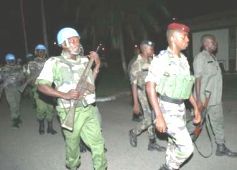Sudan ex-rebels disagree over U.N. mission nations
By Katie Nguyen
RUMBEK, Sudan, Jan 21 (Reuters) – A disagreement over which countries will take part may delay the deployment of up to 10,000 U.N. peacekeepers to southern Sudan, U.N. and former rebel sources said on Friday.

|
|
A mixed patrol of Ivory Coast and U.N soldiers walk the streets in Abidjan, December 22, 2004. (Reuters). |
The Khartoum government and Sudan People’s Liberation Army/Movement (SPLA/M) signed an agreement on Jan 9. to end Africa’s longest conflict, paving the way for the deployment of a U.N. force to monitor a permanent ceasefire.
The U.N. Security Council is expected in the coming weeks to issue a mandate for a mission of military observers and protection forces. U.N. officials have said the mission will probably number between 9,000 and 10,000 personnel.
However, senior SPLA/M official Deng Alour Deng said the former guerrilla group had expressed reservations about the countries that have volunteered staff for the U.N. mission.
“We told the U.N. that these countries must be agreed on by the two parties. They’ve chosen countries without consulting us,” Deng said by telephone from Nairobi.
More than two decades of war in Sudan’s oil-producing south, sparked by factors including Khartoum’s attempt to impose sharia (Islamic) law on the rest of the country, have killed two million people and forced millions more to flee their homes.
The conflict, between the Arabic-speaking Islamist government and southern animist and Christian rebels seeking greater autonomy, has been complicated by oil, ethnicity and ideology.
Differences over the peacekeepers threaten to stall the deployment of the force which was due to be completed within six months of the U.N. mandate being approved, U.N. sources said.
Several countries including Egypt, Kenya, Pakistan, Bangladesh, Malaysia and India have offered troops for the mission, one U.N. source said.
The source added that the SPLA/M were concerned about the predominance of Muslim nations on the list.
“We have reservations about the whole list,” Deng said without elaborating. He did not name the countries involved.
The Under-Secretary of Foreign Affairs Mutrif Siddiq told Reuters in Khartoum that the only requirements both sides had placed on the forces were that they speak both Arabic and English, the official languages of the post-peace country, and that they respect the cultures of the areas they were working in.
“These are the only conditions set from the two parties and we left the rest of the selection to the U.N, ” he said. “There is nothing to do with religion here – it is a matter of respect of culture and medium of language.”
He added that the government had not complained that the ceasefire monitoring commission in the Nuba Mountains area was a non-Muslim force, and that he had not heard about the SPLA/M complaints about the U.N. force. (Addtional reporting by Opheera McDoom in Khartoum).
